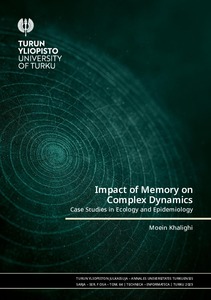Impact of memory on complex dynamics: Case studies in ecology and epidemiology
Khalighi, Moein (2025-11-28)
Impact of memory on complex dynamics: Case studies in ecology and epidemiology
Khalighi, Moein
(28.11.2025)
Turun yliopisto
Julkaisun pysyvä osoite on:
https://urn.fi/URN:ISBN:978-952-02-0345-0
https://urn.fi/URN:ISBN:978-952-02-0345-0
Kuvaus
navigointi mahdollista
kuvilla vaihtoehtoiset kuvaukset
taulukot saavutettavia
looginen lukemisjärjestys
kuvilla vaihtoehtoiset kuvaukset
taulukot saavutettavia
looginen lukemisjärjestys
Tiivistelmä
Dynamical systems are tools for modeling many real-world phenomena. However, one crucial but often overlooked aspect of such models is memory effects, where past conditions infuence future dynamics. Traditional models that lack memory are inadequate to represent the historical infuences essential for a broad comprehension of these phenomena.
In this thesis, we investigate the infuence of memory on the behavior and dynam¬ics of commonly used models. The research involves identifying different types of memory and systems, selecting appropriate modeling frameworks, and integrating memory components to quantify their impact on system dynamics. Emphasizing the importance of memory incorporation, this work focuses on models applied in ecology and epidemiology.
We used fractional calculus to introduce memory into differential equation models, allowing the infuence of past events to wane gradually. This approach mirrors many real-world scenarios where more recent events carry greater weight. The study explores the application of fractional derivatives, which are derivatives of non-integer orders, to model long-term memory effects, focusing on differential equation-based models. Additionally, the development of computational tools offers a more targeted approach to analyzing memory-augmented models.
The dissertation offers new perspectives on ecological systems by examining the infuence of memory on nonlinear behaviors, system stability, and responses to disturbances. It demonstrates how memory acts as a key factor driving complex system dynamics. In epidemiological systems, the work highlights the impact of memory on disease transmission dynamics, revealing long-term effects and showing how memory can alter outbreak predictions. These fndings emphasize the need for more sophisticated models that incorporate memory.
Key fndings, supported by publications, illustrate the practical applications of this approach across both simulated and real-world data. Incorporating memory effects into current dynamical systems modeling practices has the potential to enhance their accuracy and applicability across various disciplines.
In this thesis, we investigate the infuence of memory on the behavior and dynam¬ics of commonly used models. The research involves identifying different types of memory and systems, selecting appropriate modeling frameworks, and integrating memory components to quantify their impact on system dynamics. Emphasizing the importance of memory incorporation, this work focuses on models applied in ecology and epidemiology.
We used fractional calculus to introduce memory into differential equation models, allowing the infuence of past events to wane gradually. This approach mirrors many real-world scenarios where more recent events carry greater weight. The study explores the application of fractional derivatives, which are derivatives of non-integer orders, to model long-term memory effects, focusing on differential equation-based models. Additionally, the development of computational tools offers a more targeted approach to analyzing memory-augmented models.
The dissertation offers new perspectives on ecological systems by examining the infuence of memory on nonlinear behaviors, system stability, and responses to disturbances. It demonstrates how memory acts as a key factor driving complex system dynamics. In epidemiological systems, the work highlights the impact of memory on disease transmission dynamics, revealing long-term effects and showing how memory can alter outbreak predictions. These fndings emphasize the need for more sophisticated models that incorporate memory.
Key fndings, supported by publications, illustrate the practical applications of this approach across both simulated and real-world data. Incorporating memory effects into current dynamical systems modeling practices has the potential to enhance their accuracy and applicability across various disciplines.
Kokoelmat
- Väitöskirjat [3105]
